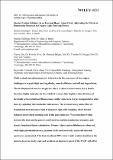Shorter Exciton Lifetimes via an External Heavy-Atom Effect: Alleviating the Effects of Bimolecular Processes in Organic Light-Emitting Diodes
Author(s)
Einzinger, Markus; Zhu, Tianyu; de Silva, Piotr; Belger, Christian; Swager, Timothy M; Van Voorhis, Troy; Baldo, Marc A; ... Show more Show less
DownloadEinzinger17AM.pdf (771.8Kb)
OPEN_ACCESS_POLICY
Open Access Policy
Creative Commons Attribution-Noncommercial-Share Alike
Terms of use
Metadata
Show full item recordAbstract
Multiexcited‐state phenomena are believed to be the root cause of two exigent challenges in organic light‐emitting diodes; namely, efficiency roll‐off and degradation. The development of novel strategies to reduce exciton densities under heavy load is therefore highly desirable. Here, it is shown that triplet exciton lifetimes of thermally activated delayed‐fluorescence‐emitter molecules can be manipulated in the solid state by exploiting intermolecular interactions. The external heavy‐atom effect of brominated host molecules leads to increased spin–orbit coupling, which in turn enhances intersystem crossing rates in the guest molecule. Wave function overlap between the host and the guest is confirmed by combined molecular dynamics and density functional theory calculations. Shorter triplet exciton lifetimes are observed, while high photoluminescence quantum yields and essentially unaltered emission spectra are maintained. A change in the intersystem crossing rate ratio due to increased dielectric constants leads to almost 50% lower triplet exciton densities in the emissive layer in the steady state and results in an improved onset of the photoluminescence quantum yield roll‐off at high excitation densities. Efficient organic light‐emitting diodes with better roll‐off behavior based on these novel hosts are fabricated, demonstrating the suitability of this concept for real‐world applications.
Date issued
2017-09Department
Massachusetts Institute of Technology. Department of Chemistry; Massachusetts Institute of Technology. Department of Electrical Engineering and Computer ScienceJournal
Advanced Materials
Publisher
Wiley Blackwell
Citation
Einzinger, Markus et al. “Shorter Exciton Lifetimes via an External Heavy-Atom Effect: Alleviating the Effects of Bimolecular Processes in Organic Light-Emitting Diodes.” Advanced Materials 29, 40 (September 2017): 1701987 © 2017 WILEY‐VCH Verlag
Version: Author's final manuscript
ISSN
0935-9648
1521-4095